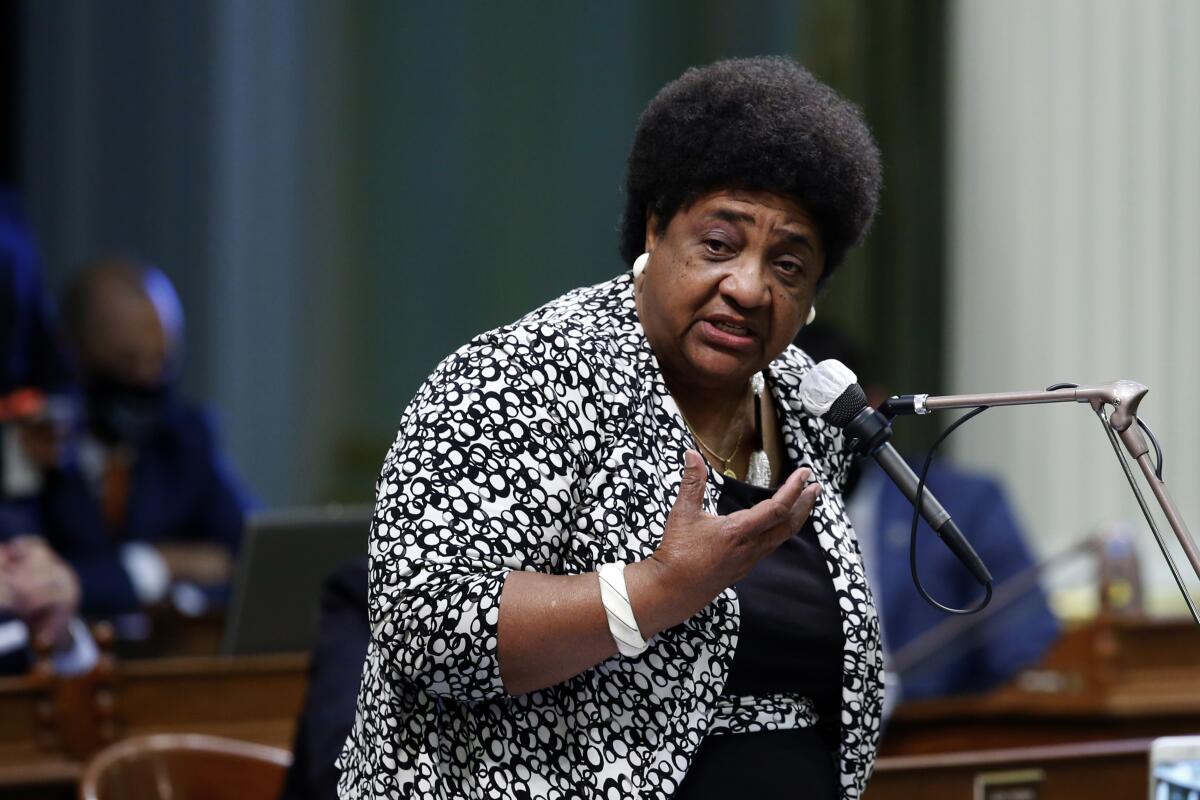Shirley Weber for secretary of state

- Share via
Shirley Weber is running for California secretary of state for the first time after holding the post for the last two years as a political appointee. Gov. Gavin Newsom named her to the office in the chain of events that followed Joe Biden winning the presidency: Kamala Harris stepped down from the U.S. Senate to become vice president, Alex Padilla stepped down as secretary of state to fill Harris’ spot in the Senate, and Weber, who was a Democratic state assemblymember, was tapped to become secretary of state.
Though she was appointed by the governor, Weber has conducted herself admirably as a nonpartisan secretary of state.
Shortly after she was named to the post in December 2020, the movement to recall Newsom gained steam. As the state’s chief elections officer, Weber oversaw several steps of the recall process. But when she faced decisions that could have benefited Newsom, she operated by the book, without a whiff of favoritism — as an elections officer should.
The L.A. Times’ editorial board endorsements for statewide ballot measures, elected offices in Los Angeles city and county, L.A. Unified School District board, L.A. county superior court, statewide offices, the state Legislature and U.S. House and Senate seats.
Weber would not budge when Newsom’s attorneys asked her to list him on the ballot as a Democrat after they blew the deadline for the required paperwork. She said she could only accept documents that were filed on time. Newsom sued Weber to try to get his party affiliation listed on the ballot, but lost.
In a different legal tangle related to the recall, Weber did not appeal a judge’s ruling that benefited Newsom’s main challenger. Republican talk radio host Larry Elder had sued Weber over the issue of whether candidates for governor in a recall election must disclose their tax returns. Newsom had signed the law in 2019 requiring gubernatorial candidates to disclose tax returns and he argued it also applied in the recall. Elder argued it did not and a judge agreed with him. Weber promptly dropped the requirement for the recall.
More recently, Weber displayed the same straight-shooter approach in response to a campaign seeking to put a measure on the November ballot to raise the minimum wage. Weber left it off the ballot because its signatures were not verified by the June 30 deadline — even though she said she knew the people behind the campaign and generally agreed with their mission. (The minimum wage initiative qualified for the 2024 ballot.)
Personal ideology shouldn’t shape how officials run elections, and Weber has proved to be a reliable and fair referee. That’s what voters need from a secretary of state.
Weber is California’s first Black secretary of state, and her long background of public service demonstrates a deep commitment to civil rights. Born to sharecropper parents in Arkansas, Weber moved to California as a child and eventually earned a PhD. She taught Africana studies at San Diego State University for 40 years, served on the San Diego Unified school board and established herself as a champion of education and police reform during four terms in the state Assembly.
Weber’s opponent, Robert Bernosky, is a longtime corporate finance executive and Republican Party officer. He’s led the San Benito County GOP for the last decade and supported Donald Trump for president as a delegate to the Republican National Conventions in 2016 and 2020.
Bernosky is not an election denier, and says he trusts the judicial system that threw out multiple lawsuits from Trump allies who claimed the 2020 election was fraudulent. He chalks up Trump’s Big Lie and the doubt sown over the validity of American elections to “a small group within the Republican Party [that] is making a lot of noise.” That’s a blasé response to such a dangerous threat to democracy.
Even though Bernosky’s platform in running for secretary of state does not go to Trumpist extremes, it taps into doubts about the electoral system. He talks about the need to “clean up” the voter rolls and address issues with noncitizens registering to vote. There were instances of that happening in 2018 when the state rushed to launch a new “motor voter” system that registers people to vote when they visit the Department of Motor Vehicles. But there’s no indication it’s continued to be a problem.
Bernosky is correct in criticizing the secretary of state’s office for botching a project to upgrade California’s campaign finance system, known as Cal-Access. The 20-year-old database holds critical information that lets the public see who’s funding campaigns and hiring lobbyists. But it frequently crashes or is out of date, defeating the goal of providing transparency about money in California politics.
A 2016 state law requires replacing Cal-Access with a modern database system that was supposed to be done in 2019. Then it was delayed until 2021. Weber recently postponed the launch again, saying the new database was not sufficiently accurate. She sent the project back to the drawing board for a restart now slated to be done around 2025.
Weber must fix the Cal-Access disaster in her next term. Voters should give her the chance to do it.
More to Read
A cure for the common opinion
Get thought-provoking perspectives with our weekly newsletter.
You may occasionally receive promotional content from the Los Angeles Times.










